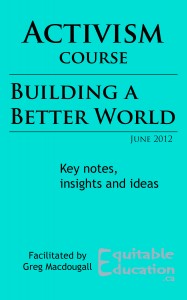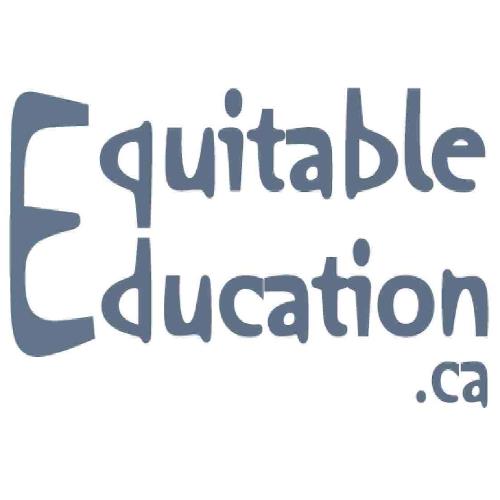
Activism Course eBook/booklet
Available for free online viewing or printing to read offline, this eBook/booklet contains much of what was covered in the Fall 2011 Activism Course: Building a Better World. Also features four appendices (two on learning frameworks) and a full page of additional resources with links…. Read or print it here
Other articles:
BOOK REVIEW: Fertile Soil for Social Change – Joan Kuyek’s “Community Organizing” a wise guide for activists
– includes 9-minute video (also embedded below at bottom of page)
Community Organizing: A Holistic Approach is indeed holistic and comprehensive. Kuyek examines the creation of positive social change based on a coherent and wide-ranging analysis of the context in which the work is done and the principles needed to make it effective.
There are three main things we need to do to move forward:
1) sharing experiences and ideas with others
2) listening to others’ experiences and ideas
3) discussion and dialogue: learning from each other, what lessons we’ve learned about how to advance forward
Healthy Roots – conference notes
Healthy Roots was a community building conference in the fall of 2003 at the University of Guelph … offering an opportunity for dialogue and learning on community issues. Specific topics covered: Anti-poverty organizing – Community Gardening – Media – The Native experience – Building Communities – Urban Sprawl.
From The Ground Up: Building Healthy Communities
Two important questions from which to base action:
1) What is required of an individual to make change happen?
– level of commitment, level of participation, willingness to challenge the status quo, and utilization of critical thinking skills to evaluate every experience2) What are the determinants of health for an individual, organization, community?
– economic, environmental, and social factors
From The Ground Up: notes from break-out groups
Diversity & Making Membership Accessible
Decision-Making
Environmental
Partnership-Building
Facilitation Training (co-written)
The workshop was delivered by Tree Bressen, of the Fellowship for Intentional Community (web site: www.ic.org). Bressen explained the need for a facilitation workshop: “Most people’s associations with meetings are that they’re long and boring and frustrating and they waste time. I think that comes out of people not handling meetings in a skilful and effective way … as you learn how to facilitate better and how to participate better … groups can have meetings that are productive, that are upbeat, that are great, fun, and make decisions together well and come out of the meetings feeling energized and not … drained.
“But we don’t grow up learning these skills, so a lot of us actually need to learn from a workshop or a book or practice or something, because a lot of us don’t grow up in institutions that really encourage this way of relating to each other.”
Guest Posts:
Being Whole, by Julie Rage Lalonde
I am deeply concerned about activism in my community lately and rather than complain about it, I want to make a call for a better environment and see who is interested.
My issue is that the environment in which I do my activism has become ugly and I have really struggled with how to deal with it.
I know that I am a product of my environment but I am also part of my environment.
On Calling People Out, by Dillon Black
It is a common, and well researched, phenomenon that when you call someone out on oppressive behaviour they often react in a predictable pattern. The pattern involves a multistep process through which they can dodge responsibility and avoid any form of accountability. This process involves denial that violence is taking place, claiming that the violence is worthwhile, de-legitimizing the person calling you out, engaging in victim blaming, silencing the survivor, as well as pointing to other examples of their life which illustrate that they could never be a _____ person.
Even though we often teach these workshops we still are fully capable of following this pattern of behaviour in response to people calling us out on oppressive behaviours. Even the best feminists/activists/people engage in oppressive behaviour, but what separates the good from the great are those who are willing to engage in self-reflexivity and challenge themselves to do better.
Video:
Joan Kuyek speaking on her book, “Community Organizing: A Holistic Approach”
 Interdependent media & in-person learning opportunities for those who are inspired to be part of movements for social justice.
Interdependent media & in-person learning opportunities for those who are inspired to be part of movements for social justice.